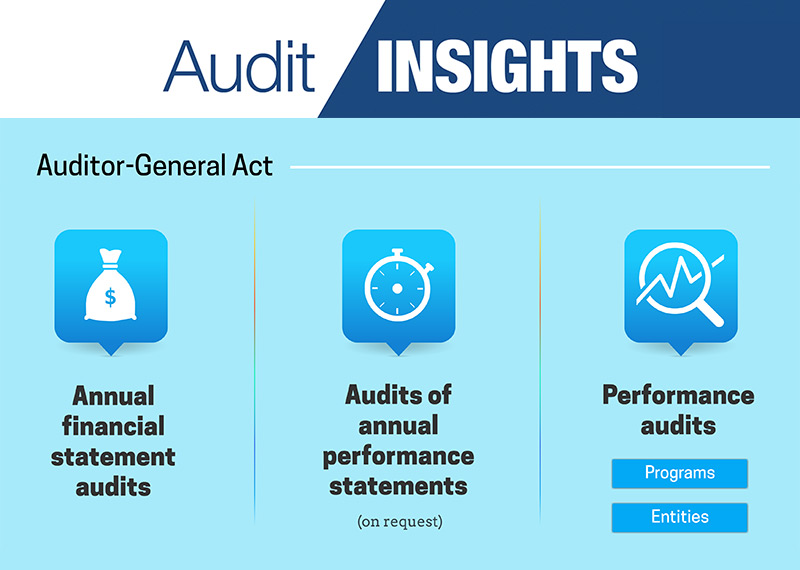Browse our range of reports and publications including performance and financial statement audit reports, assurance review reports, information reports and annual reports.
Mr P.J. Barrett (AM) - Auditor-General for Australia, presented to the Institute of Chartered Accountants of India
In August 1997, Works Australia, a former business unit of the former Department of Administrative Services,was sold by the then Office of Asset Sales (OAS). For a price of $4.2 million, the purchaser acquired the assets of Works Australia and accepted certain liabilities. At the time the sale was completed, Works Australia held $43.7 million in cash belonging to Commonwealth agencies (known as client advances). ANAO programmed an audit to examine oversight of the post-sale contractual arrangements for each of the 307 Commonwealth client advances totalling $43.7 million transferred to the purchaser and found that the $43.7 million in client advances transferred to the purchaser of Works Australia in August 1997 has been effectively accounted for as of July 2001 by the Commonwealth agencies concerned. In addition, the relevant financial security arrangements over the Works Australia client advances have been effectively administered in accordance with the terms and conditions of the Works Australia Sale Agreement by Finance.
The audit objective is to examine the effectiveness of measures taken to strengthen the protection of Australia’s missions and staff overseas.
Please direct enquiries relating to reports through our contact page.
The Auditor-General responded on 5 July 2022 to correspondence from the Hon Richard Marles MP dated 31 May 2022, requesting that the Auditor-General conduct an investigation to review the Workforce Australia procurement processes.
Please direct enquiries relating to requests for audit through our contact page.
This audit would assess the effectiveness and efficiency of cost recovery activities conducted by IP Australia. Areas to be examined would be cost recovery models used by IP Australia, including business processes, fee structures, how this links to the delivery of its business and how IP Australia ensures arrangements remain fit for purpose with changes to its operating environment. Following the Productivity Commission inquiry in 2016 and the government’s response, IP Australia has completed two fee reviews. In 2023–24 IP Australia recovered more than 98 per cent of its costs by charging for its services.
Please direct enquiries through our contact page.
The objectives of the audit were to examine and evaluate the efficiency, economy and administrative effectiveness of the non-judicial activities of the Family Court of Australia. A major aim of the audit was to identify administrative better practices that could be promulgated throughout the Court. The criteria for the audit address the following issues: corporate planning; performance measurement; organisational structure; human resource management; human resource development; management information and reporting systems; and operational processes and procedures.
The objective of the audit was to assess the effectiveness of the Department of Agriculture, Fisheries and Forestry’s administration of the Northern Australia Quarantine Strategy. The ANAO examined whether the department had established effective:
- administrative and governance arrangements to support NAQS;
- processes for identifying biosecurity risks and conducting scientific activities to address identified risks;
- arrangements for managing the quarantine aspects of Torres Strait border movements; and
- public awareness activities that reflect identified biosecurity risks and support the program’s objectives.
The objective of this audit was to examine Australia's preparedness to respond to a human influenza pandemic and an outbreak of avian influenza in domestic poultry. The audit assessed:
- the whole of government arrangements for an influenza pandemic;
- action taken by DAFF to implement the recommendations from Exercise Eleusis, which tested the response arrangements for avian influenza;
- DoHA's planning for, and execution of, Exercise Cumpston, which tested the preparedness and response to an influenza pandemic; and
- the establishment, management and deployment arrangements of the National Medical Stockpile.
The objective of the audit was to assess FSANZ's administration of its food standard functions, as specified in the Food Standards Australia New Zealand Act, 1991 (last amended 2007).
Particular emphasis was given to whether:
- FSANZ's performance management and reporting provided effective support and ensures accountability;
- FSANZ effectively administered its food standard development and variation function, including its stakeholder management; and
- FSANZ effectively monitored the implementation of its standards and coordinates relevant jurisdictions to address market failures.
This audit would examine the effectiveness of the Australian Government’s response to scams in Australia.
Scams are a growing threat to Australian consumers and businesses, with financial losses to scams reported to be at least $3.1 billion in 2022 (a 72 per cent increase on losses recorded in 2021). In 2021–22, 65 per cent of Australians were exposed to a scam attempt, up from 55 per cent in the previous year. Since 1 July 2023, the National Anti Scam Centre in the ACCC has aimed to link government organisations, industry and Australians to work together to prevent scam activity. From 1 July 2026 the Scams Prevention Framework, coordinated by the Department of the Treasury will come into effect. This is expected to formalise the work of the department in coordinating scam prevention efforts with industry.
Please direct enquiries through our contact page.
The objective of the audit was to assess the effectiveness of Australia’s arrangements to meet its treaty obligations under three selected treaties:
- International Convention on Civil Liability for Bunker Oil Pollution Damage 2001;
- Agreement between Australia and the International Atomic Energy Agency for the Application of Safeguards in connection with the Treaty on the Non-Proliferation of Nuclear Weapons of 1 July 1968 and Additional Protocol; and
- Convention on the Rights of the Child 1990.
Please direct enquiries relating to reports through our contact page.
The objective of this audit was to assess the extent to which the Department of Agriculture and Water Resources (Agriculture) has addressed the recommendations from ANAO Audit Report No. 46 of 2011–12, Administration of the Northern Australia Quarantine Strategy (NAQS).
Please direct enquiries through our contact page.
The objective of this audit was to assess the effectiveness and efficiency of Indigenous Business Australia’s (IBA's) management of its business support and investment activities.
Please direct enquiries through our contact page.
In this inaugural edition of audit insights, we look at the history and mandate of the Auditor-General of Australia, the functions delivered under the Auditor-General Act, the purpose of the Australian National Audit Office (ANAO) and our relationship with the Australian Parliament.
Please direct enquiries relating to audit insights through our contact page.
Presentation by the Indonesian Ambassador, His Excellency, Primo Alui Joelianto Embassy of the Republic of Indonesia, to the Auditor-General for Australia, Mr Mr Ian McPhee
The Auditor-General responded on 6 April 2016 to correspondence from Senator Hanson-Young on 30 March 2016 regarding Refugee resettlement deal established between the Commonwealth Government of Australia and the Kingdom of Cambodia in September of 2014.
Please direct enquiries relating to requests for audit through our contact page.
The objective of the audit was to assess the effectiveness of Customs and Border Protection's performance in managing and coordinating enforcement operations against illegal foreign fishing in Australia's northern waters. The audit focused on Customs and Border Protection's role within the whole of government policy coordination framework; the effectiveness of its intelligence support for operational planning and policy and strategy development; its performance in planning, prioritising and administering effective enforcement operations; and its performance in measuring and reporting on the effectiveness of the program.
On 9 May 2006, the Auditor-General advised the then Minister for Transport and Regional Services that he would undertake a performance audit and that the specific audit objectives and approach would be established once officers of the Australian National Audit Office (ANAO) had the opportunity to undertake preliminary enquiries with senior staff in Airservices Australia and the Department of Transport and Regional Services (DOTARS). On 31 May 2006, the Auditor-General designated a performance audit under Section 18 of the Auditor-General Act 1997 (Auditor-General Act). The objectives of the performance audit were to: examine the development and administration by Airservices Australia of its contracts with the Solomon Islands Government for upper airspace management; assess the regularity of payments made under the contracts and steps taken by Airservices Australia in respect of any irregularities; and make recommendations for any improvements in the processes employed by Airservices Australia in developing and administering these and similar contractual arrangements.
The purpose of the audit was to assess the effectiveness of Sport Integrity Australia’s management of the National Anti-doping Scheme.
Please direct enquiries through our contact page.
The audit would examine the effectiveness of the administration of the PALM scheme. The Pacific Australia Labour Mobility (PALM) scheme is Australia’s primary temporary migration program and supports Australia’s strategic interests in the Pacific. The PALM scheme helps to fill unskilled to semi-skilled jobs in rural and regional Australia, and in agriculture and food processing nationally, by offering eligible employers access to a pool of workers from the Pacific Islands and Timor-Leste. The PALM scheme is managed by the Department of Employment and Workplace Relations and the Department of Foreign Affairs and Trade. In 2023–24, the PALM Scheme’s administered expense budget was $11.0 million. As at 30 June 2024, there were 34,230 workers participating in PALM with 478 participating employers.
Please direct enquiries through our contact page.
Mr Ian McPhee - Auditor-General for Australia, presented at the Australian Institute of Company Directors Public Sector Governance Conference
The objective of this audit was to assess the provision of export assistance and support to new and irregular exporters in rural and regional Australia through the TradeStart program. The focus on rural and regional Australia reflects the priority given by the Government to providing effective business and trade assistance to small businesses and rural and regional businesses. However, broader aspects of TradeStart management, such as contract and risk management, have been assessed across the program as a whole.
The objective of the audit was to assess whether Services Australia had effectively managed risks related to the rapid preparation for and delivery of COVID-19 economic response measures.
Please direct enquiries through our contact page.
The objective of this audit was to assess whether the Federal Court of Australia is effectively managing the use of corporate credit cards for official purposes in accordance with legislative and entity requirements.
Please direct enquiries through our contact page.
- Services Australia’s personal leave policy requires documentary evidence supporting personal leave applications to be submitted within five working days of returning to work following absence. Entities should, where appropriate develop policies for unscheduled leave such as personal (and carer’s) leave that include specific requirements for unscheduled leave applications and supporting documentary evidence to be submitted within an appropriate and measurable timeframe.
- AgriFutures Australia fully documented its handling of probity allegations, which demonstrated a positive, transparent approach to managing probity. Such matters also represent an opportunity to test controls to ensure they are effective and can be used as a case study to train staff.
The audit objective was to assess the effectiveness of the Department of Industry's administration of the Commercialisation Australia Program.
Please direct enquiries relating to reports through our contact page.
The objective of the audit was to assess how well EMA is meeting its objective of providing national leadership in the development of measures to reduce risk to communities and manage the consequences of disasters.
- AgriFutures Australia maintained a comprehensive gifts register, which helped it demonstrate that it is appropriately managing its risks of inappropriate external influence. Similarly, retaining records of credit card transactions and their timely review, as the Grains Research and Development Corporation generally did, helps demonstrate that an entity is appropriately managing its credit card risks.
The audit objective was to examine whether Airservices Australia has effective procurement arrangements in place, with a particular emphasis on whether consultancy contracts entered into with International Centre for Complex Project Management (ICCPM) in association with the OneSKY Australia project were effectively administered.
Please direct enquiries relating to reports through our contact page.









